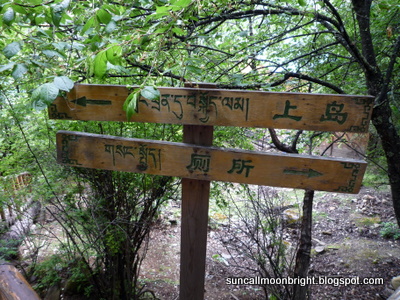View the previous post here or return to the trip index here.
01 Jun 2009
Today we would be visiting some of the sights around Nyingchi county. While most other tours will head over by coach from Lhasa and return there, having flown to Nyingchi directly, we will only be traveling to Lhasa the day after. First up, we will be visiting Basomtso (巴松错, Ba Song Cuo, Cuo meaning tso, i.e. lake in Tibetan), a scenic highland lake with a four A grade by the National Tourism Administration.

Pit stop by the road, the best toilets in Tibet are the natural ones



Along the highway, we observed many snowy peaks and green slopes here. It snows every night and melts in the daytime

We stopped by a small town before reaching the lake and our tour guide originally wanted to arrange for lunch in this dodgy little place. Seems like they're closed after all.

Having reached the lake, we made our way down to the shore where a floating platform links to a small island on it. Entry costs RMB 100.
Aerial view of the lake

A stone with what looks like Om mani padme hum inscribed on it

A platform bridge being constructed

Heading towards the island, there's a temple there

Seems like there are lake cruises available from here

In the middle of the island is a temple

Mani Wheels


The guardians of the temple, two at the base...


... two more at the top of the steps.

After visiting inside, we walked around the temple in clockwise fashion

A water burial (水葬, shui zang) site, with hanging holy scriptures. One of the ways in which Tibetans use to bury their dead. The body of the deceased is systematically dissected on the large flat stone after some rites are performed. Then, the flesh is fed to the fishes in the lake. Hence, Tibetans do not eat fish although there is an abundance of rivers and lakes. This water burial site has not been used in 50 years. A closely related form of burial that is more commonly used nowadays is a sky burial (天葬, tian zang) where the flesh and entrails are fed to vultures and crows respectively. It is said that when the animals consume the meat cleanly without leftovers, the deceased is a good person, otherwise the deceased is a bad one. There are numerous sky burial sites in the areas with Tibetans and we passed by a rather low sky burial site in Qinghai later in this trip.
According to our guide, there are a variety of reasons for such burial practices. First, Tibetans being majority Buddhists place little emphasis on the body after death. Furthermore, in the past, fuel is expensive. Consequently, only the rich were able to cremate their dead. Last, being a people not heavily reliant on agriculture and more on herding, they have little respect for the soil and would rather not let others trample upon the remains of their deceased in the ground. Other reasons include certain areas that have thin soil layers with hard rock or permafrost beneath that makes burial impossible.
According to our guide, there are a variety of reasons for such burial practices. First, Tibetans being majority Buddhists place little emphasis on the body after death. Furthermore, in the past, fuel is expensive. Consequently, only the rich were able to cremate their dead. Last, being a people not heavily reliant on agriculture and more on herding, they have little respect for the soil and would rather not let others trample upon the remains of their deceased in the ground. Other reasons include certain areas that have thin soil layers with hard rock or permafrost beneath that makes burial impossible.

We continued to circle the lake

The floating bridge that we crossed to get to the island. On the main shore are some souvenir shops

Panorama of the blue waters


Leaving the island

I am not sure what these rocks are for but judging from the white khatas on them, they probably have some religious purpose

Ah! Another of those fragrant pigs

Panorama of the island on the Basomtso, taken from the carpark at the top

Aerial view of the island, it's puny compared to the lake

Some peaks near the lake

We returned to the small town for lunch

That included many other dishes and fish!
No comments:
Post a Comment